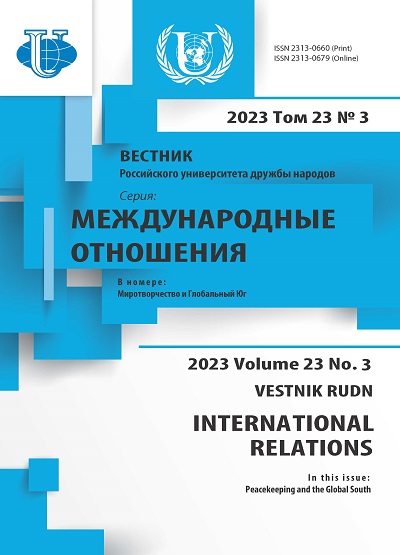OUIS and MINUSCA in the CAR: The Effectiveness of Realist and Liberal Peacekeeping Paradigms
- 作者: Bovdunov A.L.1
-
隶属关系:
- Eurasian Movement International
- 期: 卷 23, 编号 3 (2023): Peacekeeping and the Global South
- 页面: 480-496
- 栏目: THEMATIC DOSSIER
- URL: https://journals.rudn.ru/international-relations/article/view/36152
- DOI: https://doi.org/10.22363/2313-0660-2023-23-3-480-496
- EDN: https://elibrary.ru/GYKHEP
如何引用文章
详细
The conflict in the Central African Republic (CAR) has attracted international attention since the early 2000s. The African Union, the United Nations (UN) and the French Republic have all been involved in trying to help resolve the conflict. Since 2018, Russia has been actively involved in resolving the conflict in the Central African Republic. The government and people of the CAR have repeatedly expressed their dissatisfaction with the functioning of the United Nations Multidimensional Integrated Stabilization Mission in the Central African Republic (MINUSCA) contingent and, conversely, expressed their appreciation for the Russian military specialists stationed in the CAR. The author attempts to compare the effectiveness of the UN peacekeeping contingent (MINUSCA) and Russian military specialists operating under the auspices of the Officers Union for International Security (OUIS), based on the essential unity of purpose of these forces. Based on an analysis of data on state control in the CAR and violent incidents from 2014 to 2022, the author concludes that the Russian contingent is more effective in providing security and strengthening the state in the CAR (tasks also outlined in the MINUSCA mandate). The author also analyzes the problems in the functioning of the UN peacekeeping contingents, highlighting their systemic and structural shortcomings. The main shortcoming, however, in his view, is the UN’s commitment to a liberal approach that challenges the sovereignty of the host state. The Russian realist approach, by contrast, focuses on sovereignty and its power component. Thus, the actions of the Russians in the CAR can be studied within the paradigm of “illiberal” peacekeeping.
作者简介
Aleksandr Bovdunov
Eurasian Movement International
编辑信件的主要联系方式.
Email: alexander.bovdunov@yandex.ru
ORCID iD: 0000-0002-4977-0351
PhD (Political Science), Leading Analyst
Moscow, Russian Federation参考
- Adamo, A. (2020). Mercenaries or peacekeepers? Comparing executive outcomes and ECOMOG in Sierra Leone. Africana Studia, (33), 153-169. Retrieved from https://ojs.letras.up.pt/index.php/AfricanaStudia/article/view/10390
- Bratersky, M. V. (2018). Russia and peacekeeping operations: Conceptual and practical components of Russia’s policy. International Organisations Research Journal, 13(1), 157-170. https://doi.org/10.17323/1996-7845-2018-01-09
- Cavalcante, F. (2014). The Influence of the liberal peace framework on the United Nations approach to peacebuilding in Guinea-Bissau. RCCS Annual Review, (6), 141-161. https://doi.org/10.4000/rccsar.564
- Filippov, V. R. (2019). Central African Republic: Confrontation between the Kremlin and the Elysee palace. LOKUS: Lyudi, Obshchestvo, Kul’tura, Smysly, (1), 124-143. (In Russian).
- Finkenbusch, P. (2021). Liberal peace: From civilising mission to self-doubt. Global Change, Peace & Security, 33(2), 163-176. https://doi.org/10.1080/14781158.2021.1932783
- Fitzsimmons, S. (2012). Mercenaries in asymmetric conflicts. Cambridge: Cambridge University Press. https://doi.org/10.1017/CBO9781139208727
- Jabri, V. (2010). War, government, politics: A critical response to the hegemony of the liberal peace. In O. P. Richmond (Ed.), Palgrave advances in peacebuilding (pp. 41-57). London: Palgrave Macmillan. https://doi.org/10.1057/9780230282681_3
- Karlsrud, J. (2015). The UN at war: Examining the consequences of peace-enforcement mandates for the UN peacekeeping operations in the CAR, the DRC and Mali. Third World Quarterly, 36(1), 40-54. https://doi.org/10.1080/01436597.2015.976016
- Khudaykulova, A. V. (2019). UN peacekeeping in the 21st century: Key vectors of reforms to improve effectiveness of peacekeeping operations. South-Russian Journal of Social Sciences, 20(4), 109-126. (In Russian). https://doi.org/10.31429/26190567-20-4-109-126
- Klishas, A. A. (2018). Legality and legitimacy of public political power: Theoretical aspects (on the basis of Syria). RUDN Journal of Law, 22(1), 1-20. (In Russian). https://doi.org/10.22363/2313-2337-2018-22-1-1-20
- Kostelyanets, S. V. (2020). Russia’s peace mediation in Africa: An assessment. Vostok. Afro-Aziatskie Obshchestva: Istoriia i Sovremennost’, (6), 96-106. (In Russian). https://doi.org/10.31857/S086919080012475-9
- Maiangwa, B., & Suleiman, M. D. (2017). Liberal peace intervention in the Central African Republic: Limitations and reworking a “hybrid” order. African Security, 10(1), 1-24. https://doi.org/10.1080/19392206.2016.1270138
- Mills, G., & Stremlau, J. (Eds.). (1999). The privatization of security in Africa. Johannesburg: SANA.
- Newman, R., Paris, R., & Richmond, O. P. (2009). Introduction. In R. Newman, R. Paris & O. P. Richmond (Eds.), New perspectives on liberal peacebuilding (pp. 3-25). Tokyo, New York, Paris: UN University Press.
- Nikitin, A. I. (2016). United Nations peace operations: Reconsidering the principles, reforming the practice. World Eсonomy and International Relations, 60(3), 16-26. (In Russian). https://doi.org/10.20542/0131-2227-2016-60-3-16-26
- Owen, C., Juraev, Sh., Lewis, D., Megoran, N., & Heathershaw, M. N. (Eds.). (2018). Interrogating illiberal peace in Eurasia. Lanham, Maryland: Rowman & Littlefield.
- Philipsen, L. (2014). When liberal peacebuilding fails: Paradoxes of implementing ownership and accountability in the integrated approach. Journal of Intervention and Statebuilding, 8(1), 42-67. https://doi.org/10.1080/17502977.2014.877628
- Reno, W. (2001). The failure of peacekeeping in Sierra Leone. Current History, 100(646), 219-225. https://doi.org/10.1525/curh.2001.100.646.219
- Richmond, O. P. (2005). The transformation of peace. Basingstoke: Palgrave Macmillan. https://doi.org/10.1057/9780230505070
- Russell, J. (2014). Ramzan Kadyrov’s “illiberal” peace in Chechnya. In A. L. Huérou, A. Merlin, A. Regamey & E. Sieca-Kozlowski (Eds.), Chechnya at war and beyond (pp. 133-151). London: Routledge. https://doi.org/10.4324/9781315798318-8
- Taylor, I. (2017). The liberal peace security regimen: A Gramscian critique of its application in Africa. Africa Development, 42(3), 25-44.
- Trenin, D. (1996). Russia. In T. Findlay (Ed.), Challenges for the new peacekeepers (pp. 68-84). Oxford: Oxford University Press. Retrieved from https://www.sipri.org/sites/default/files/files/RR/SIPRIRR12.pdf
- Tuvdendarjaa, M. (2022). Challenges of the United Nations peacekeeping operations. Security Nexus, 23, 1-6. Retrieved from https://dkiapcss.edu/nexus_articles/challenges-of-the-united-nations-peacekeeping-operations/
- Van der Lijn, J., Glawion, T., & de Zwaan, N. (2019). Securing legitimate stability in CAR: External assumptions and local perspectives. Stockholm: SIPRI. Retrieved from https://www.sipri.org/publications/2019/other-publications/securing-legitimate-stability-car-external-assumptions-and-local-perspectives
- Wallensteen, P. (2015). Quality peace: Peacebuilding, victory, and world order. Oxford: Oxford University Press.
- Weber, M. (2008). Types of authority. Person. Culture. Society, 10(1), 31-47. (In Russian).
- Williams, P. D. (2023). How peacekeepers fight: Assessing combat effectiveness in United Nations peace operations. Security Studies, 32(1), 32-65. https://doi.org/10.1080/09636412.2023.2178965
补充文件
没有额外的文件显示








